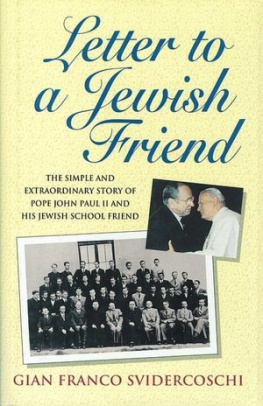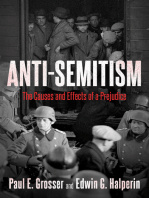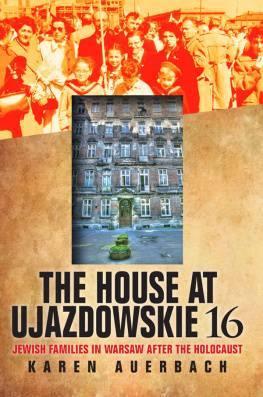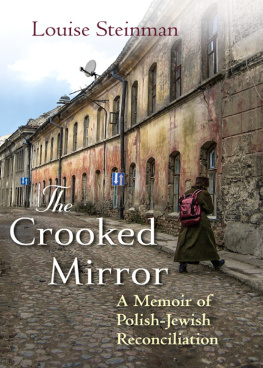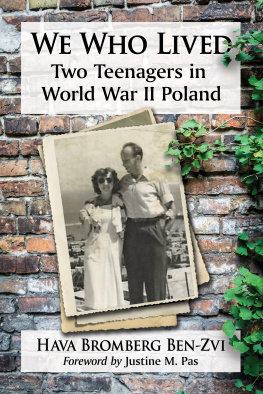LETTER TO A JEWISH FRIEND
The simple and extraordinary story ofPope John Paul II
and his Jewish school friend
Gian Franco Svidercoschi
Translated by Gregory Dowling

Crossroad New York
TheCrossroad Publishing Company
370Lexington Avenue, New York, NY 10017
Copyright 1993 by Arnoldo Mondadori
Theright of Gian Franco Svidercoschi to be identified as the Author of the Workhas been asserted by him in accordance with the Copyright, Designs and PatentsAct 1988.
Newmaterial included in the American edition Copyright 1994 by theAnti-Defamation League.
Originallypublished by Arnoldo Mondadori Editore as lettera a un amico ebreo: La storiasemplice e straordinaria dell'amico ebreo di Karol Wojtyla, 1993.
FirstEnglish language edition published by Hodder & Stoughton, London, England,1994.
Allrights reserved. No part of this book may be reproduced, stored in a retrievalsystem, or transmitted, in any form or by any means, electronic, mechanical,photocopying, recording, or otherwise, without the written permission of TheCrossroad Publishing Company.
Printedin the United States of America
Libraryof Congress Catalogue Card Number: 94-69812
ISBN:0-8245-1482-3
Prologue:Letters to our Readers
Letter fromJohn Cardinal O'Connor
This haunting, poignantstory of the extraordinary and beautiful friendship between Jerzy Kluger andKarol Wojtyla, a friendship deepened, not lessened, by Karol Wojtyla's becomingPope John Paul II, is itself a paradigm of the Anti-Defamation League'srelationship with the Catholic Church. While the ADL consistently opposesdefamation, it is equally committed to the advance of understanding.
The conversationsbetween Jerzy and Karol in their student days reveal what I profoundly believeto be the "naturalness" of what relations between every Jew and everyCatholic should be. Unstrained, they have a taken-for-granted quality about them which Ipersonally find in my own relationships with Jewish friends in New York andelsewhere, as when a Rabbi friend asks me to pray for his sick son. Indeed,without wanting to be pretentious, I must confess that the conversations remindme very much of my own televised conversation with Elie Wiesel.
I can not but believethat both in his student days and in his current life as Pope, Karol Wojtyla,now John Paul II, was and is unselfconsciously shaped by his fundamentalgratitude for Judaism as the very root of his Catholicism. I suspect that suchaccounts in part, at least, for his genuine surprise when any of his words oractions or omissions offend our Jewish brothers and sisters. He seems simply toassume that his love for them and for Judaism itself is so strong that his goodintentions should be recognized, even if what he says or does or fails to sayor do might be negatively construed.
Jerzy, himself, seems tobelieve such of his old friend, for he resolves to renew the long-ago schoolboyrelationship even though now Karol is Pope, and some of Jerzy's friendsquestion the relationship. I would like to meet Jerzy. He reminds me of some ofmy friends in the ADL and a variety of other Jewish organizations. I puzzlethem at times, they disagree with me on certain issues, but they break breadwith me shamelessly, advise me forthrightly, and forgive me the otherwiseunforgivable because they know that I love them.
Not long ago I saw a beautiful television show basedon correspondence between George Bernard Shaw and a Benedictine Abbess. It wasexquisitely done. I would hope that one day soon the ADL would translate GianFranco Svidercoschi's Letter to aJewish Friend into the magic of television, to touch the heartsof millions of Jews and Christians even more impellingly, if possible, than hedoes in his book. But whether they do so or not, in this publication alone,readers are given a precious gift.
John Cardinal O'Connor Archbishop of New York
Letter fromAbraham H. Foxman
The story told in thisbook, Letter to a JewishFriend , by Gian Franco Svidercoschi about two childhood friends,both Polish one a Catholic and the other a Jewis a simple story, but also anextraordinary one. A story about friendship that crosses all religious andsocial boundaries should, in fact, be entirely normal and commonplace.Unfortunately, however, this has not always been the casenot in present timesand certainly not in the past. That is why this book is so special andimportantwith its description of the strength and beauty of a friendship andthe contribution it makes, through the example it sets, to the creation of abetter world in which every human being may enjoy the respect he or shedeserves.
The very specialsignificance of this book also lies in the historical events providing thebackdrop for the story: the Holocaust, which cancelled from the face of theearth one third of the Jewish people; the terrible world war in which hundredsof thousands of Poles perished, amidst countless other victims; the chaos thatthen descended upon Europe and the rest of the world.
But the mostextraordinary aspect of the true story told in this book is the fact that the Catholicfriend eventually rose in the hierarchy of the church, becoming, first, a highofficial and, ultimately, a Pope, adopting the name of John Paul II. Meanwhile,in the same post-war period, the Jewish friend also comes to live in Rome, andhere the two renew their old friendship.
This story in itself hasthe power of dissipating the stereotypes and prejudices that still provideobstacles to human relations, especially those between the Jewish and Christiancommunities of the world. It was therefore natural that The Anti-DefamationLeaguefounded to combat anti-Semitism, prejudice and dis- crimination, with the aim of creating a better societybased on mutual respectwould see in this book an important contributiontowards the achievement of its ideals.
Pope John Paul II's deep commitment to the greatrapprochement between the Catholic Church and the Jewish people has beenfundamental, and one of its crowning achievements has been the establishment offull diplomatic relations between the Holy See and the State of Israel. Israeland the Jews of the diaspora have been moved by John Paul II's many, heart-feltreferences to the sin of anti-Semitism exemplified in the horror of theHolocaust. May the new relations between Israel and the Vatican, between thechurch and the Jewish people, help us and the rest of the world to move a stepcloser to "Shalom."
Abraham H. Foxman
NationalDirector Anti-Defamation League
Letter fromEdward Cardinal Cassidy
Gian FrancoSvidercoschi's decision to publish the story of the friendship between KarolWojtyla and Jerzy Kluger is one that will bring joy and tears to those who readhis account. For it is not only the story of a life-long friendship between twoneighbours of Wadowice in Poland, one of whom we know as Pope John Paul II, butit brings the reader into close and intimate touch with the horrors of the Shoah, or so-called Holocaust.
For this friend of PopeJohn Paul II, Jerzy Kluger, comes from what was a relatively large Jewishpopulation of Wadowice, almost entirely wiped out by the Nazi persecutionduring the Second World War.
This moving account ofthe relationship between the young Karol Wojtyla and his Jewish friend throws aspecial light on Pope John Paul's dedication to the promotion ofCatholic-Jewish relations. There is no doubt that under the present Pontificatethose relations have improved greatly. There is a new spirit of mutualunderstanding and respect, of good-will and reconciliation, of cooperation andcommon goals between Jews and Catholics, and much of the credit for this goesto the Pope who not only has opened the doors of the Vatican to Jewish leaderscoming to Rome, but has visited them on his pastoral journeys throughout theworld and taken every possible occasion to address in his speeches questions ofconcern to the two faith communities. It is this Pope who for the first timevisited the Great Synagogue of Rome and presided over a special Concert in theVatican in commemoration of the Holocaust.
Next page
